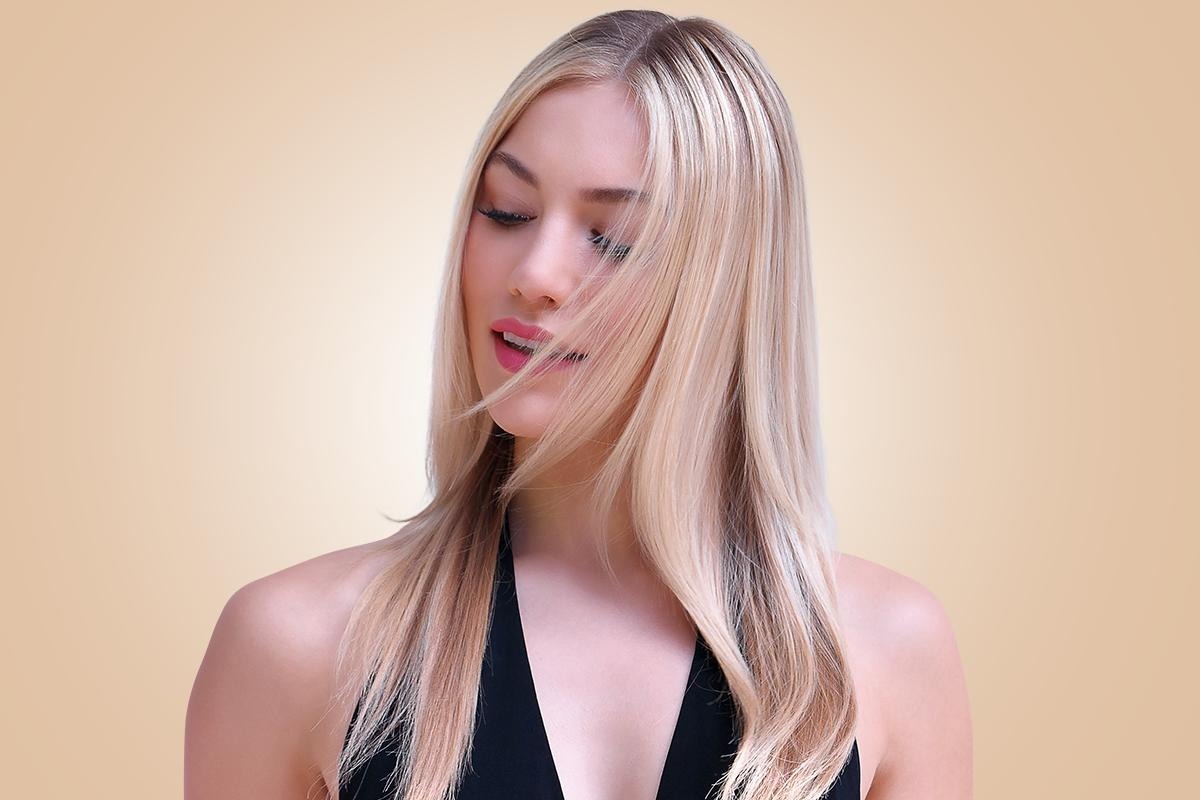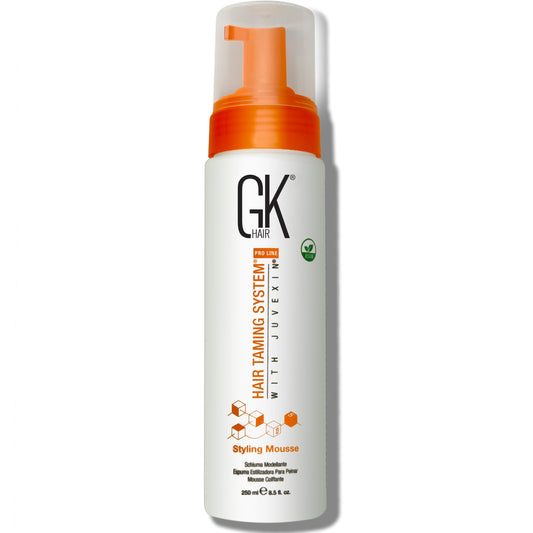Are you confused about the difference between a hair serum and oil? You're not alone! Many people struggle to understand the distinction between these two products, making it difficult to decide which is right for your hair. In this blog post, we'll explain what sets serums and oils apart so that you can choose the best product for your needs. We'll also look at how they work together to give your locks a healthy shine. So let's dive into the world of hair serums and oils!
Is a Hair Serum The Same As an Oil?
Hair serums and oils are two popular products that keep hair looking healthy and shiny. Both products help protect the hair, but each has its own benefits and should be utilized at different times.
Hair serums are formulated to seal in moisture and tame frizz. They contain silicones that coat the hair shaft, providing a smooth finish and plenty of shine. Hair serums like GK Hair's Argan Oil serum also add a layer of protection from heat styling, humidity, fading color, and split ends.
Oil can also be combined with serums for added conditioning and nourishment. Oils are typically made up of natural ingredients like castor or coconut oil that penetrate deeply into the scalp, moisturizing it from within. Hair oils are heavier than serums, so they should always be used on dry hair only. This is because oil seals the cuticles, which prevents further moisture absorption if applied before shampooing or conditioning - which could lead to limp hair that doesn't hold its style well.
These two products complement each other very nicely as they offer unique benefits that cater to different needs when it comes to keeping your mane healthy and beautiful.
What Is an Argan Oil Hair Serum?
Argan oil serum is a beauty product derived from the Argan tree, native to Morocco. This all-natural, nutrient-rich oil is highly sought for its unique conditioning and moisturizing properties. It is quickly absorbed into the hair shaft, leaving it soft, shiny, and manageable without any greasy residue. One of the most appealing aspects of argan oil serum is that it not only nourishes and conditions the hair but also helps to protect against further damage from heat styling tools such as curling irons and blow dryers.

The high levels of vitamins, minerals, and antioxidants found in Argan oil help to strengthen the hair follicles while replenishing lost moisture. As a result, hair remains healthy and vibrant with fewer split ends. This can significantly reduce breakage thanks to increased elasticity due to increased hydration levels supplied by the serum.
This shine-boosting serum can also be used as a leave-in conditioner or styling aid due to its light texture, which doesn't weigh down even with fine hair types. In addition to being lightweight and non-greasy, argan oil serum also helps maintain natural oils in the scalp without making hair appear oily or greasy - making it an ideal choice for those dealing with an oily scalp but dry ends. Many products in the market offer Argan Oil Serum, like GK Hair's Argan Oil Serum infused with Juvexin. This advanced anti-aging protein protects your overall hair.
Overall, argan oil serum offers numerous benefits compared with traditional styling oils because it not only nourishes and hydrates but also protects from environmental stressors such as UV rays or windy climates that can contribute to further damage over time. With regular use, this luxurious treatment will make your tresses look smooth and glossy every time!
When Should You Apply a Hair Serum or Oil?
Hair serums are a great product to add to any hair care routine due to the many benefits they can provide. But knowing when you should apply hair serum and how it differs from other products like oil can be confusing. The best time to use a hair serum is after washing, conditioning, and towel-drying your hair. This allows the product to penetrate the cuticles of the hair strands.
Unlike oil, which is usually applied before shampooing, serums are designed to be applied afterward. Oil can weigh down and clog the follicles of clean, wet hair, so it's best used on slightly damp or dry locks. Hair serums typically contain silicones that help create a protective barrier against heat and UV damage while protecting against split ends when brushing or styling.
In addition to this protective quality, serums often contain active ingredients such as vitamins, minerals, antioxidants, and herbal extracts, which can nourish the scalp and give shine and moisture back into your tresses. Applying serum just after toweling off will allow these beneficial components to penetrate your strands without being diluted by water or rinsed away by shampooing.
Rather than adding oil-based products throughout the day for extra nourishment or shine, applying a few drops of serum once will help combat frizziness caused by humidity in the air and protect your locks from environmental aggressors such as sun exposure or windy days. As an added bonus, most formulas are designed with non-greasy formulas, so you won't need to worry about feeling weighed down! So if you want all-day hydration with additional benefits like strengthening and protection from heat damage, applying hair serum should be part of your regular routine!

Serum pro tips
Before we end this blog, here are some pro tips for you!
- When choosing a serum, look for one that is specifically designed for the type of hair you have. It should be lightweight and non-greasy, so it doesn't weigh down your locks or leave any residue.
- If you have thick or curly hair, use a more concentrated serum. It will help tame unruly tresses and provide a long-lasting definition to your style. A heavier formula can also provide extra nourishment for dry ends.
- Always distribute the product evenly through your strands, starting at the tips and working toward the scalp to ensure maximum coverage and absorption.
- Using too much serum can do more harm than good — excess product can make your hair feel heavy and greasy, so don't overdo it! Only use what's necessary to achieve desired results.
- Hair serums are also a great way to keep flyaways in check throughout the day. Simply rub a small amount between your palms and then lightly apply it on the areas that need taming.
- To ramp up your beauty routine, combine a serum with oil treatments such as argan or coconut oil — this will give you maximum hydration without weighing down your locks or making them look greasy.
The Bottom Line
In conclusion, hair serum and oils are great products to add to your hair care routine. While oil is best for moisturizing the scalp and restoring shine, a serum is better at providing protection from heat damage and taming frizz. Depending on what you need most out of a product, either one could be beneficial in helping you achieve healthier-looking hair. Ultimately it's up to you as an individual to determine which product works best for your specific needs—but no matter what choice you make, oil or serum can help keep your locks looking healthy!
FAQ's
Can I use hair serum or oil on oily hair without making it greasy?
Yes, you can use hair serum or oil on oily hair, but it's essential to choose lightweight, non-greasy formulas. Apply sparingly, focusing on the ends rather than the roots, to avoid excess oiliness. Look for serums or oils labeled as suitable for all hair types or specifically for oily hair.
How often should I use hair serum or oil for optimal results?
The frequency of use depends on your hair type and needs. For most hair types, applying serum or oil 2-3 times a week is sufficient. However, individuals with very dry or damaged hair may benefit from more frequent application, while those with oily hair should use these products more sparingly.
Can I use both hair serum and oil in my hair care routine?
Yes, you can use both hair serum and oil in your routine, but it's crucial to layer them correctly. Start with the lighter serum and then apply the oil for added nourishment. Avoid using excessive amounts to prevent your hair from becoming weighed down.












Leave a Comment